最新高一英语知识点总结
最详细高一英语知识点总结归纳5篇

最详细高一英语知识点总结归纳5篇英语是我们学习的主要科目之一,英语作为国际性语言,学好英语自然有很多好处。
学习英语要从最基础的学问开始学,而且需要端正学习看法,因为学习外语需要坚持。
下面就是我给大家带来的高一英语学问点,希望能关怀到大家!高一英语学问点总结11)common表示一般的,常见的;共同的;共有的;一般的。
作名词,表示(公有)草地。
becommonknowledge人所共知。
thecommontouch平易近人的美德commonground共同的意见,利益,目标等commonsense常识,情理区分common,ordinary,usual,general,normalcommon指因许多事物或许多人所共同具有而常见的意思。
ordinary指由于与一般事物性质和标准相同,因此显得平常,无惊奇之处。
usual通常的,惯常的,含有随集体风俗或个人习惯而常常发生之意。
normal意为正常的,强调正常性。
2)technology和techniquetechnology是技术的总称,不是指一项一项的具体技术,是不行数名词。
technique表示某种技能,技巧,指一项一项的技术技巧,是可数名词。
3)simple表示简洁明了,不冗杂,朴实,不浮华。
还可以表示天真的,率真的;无阅历的,稚嫩的。
4)deal作不及物动词,意为经营,在所经营的对象前面加in,多指经营货物,公债,股票等。
dealwith常表示的意思有:处理,解决,支配;对待,对付,主语是人;谈论,涉及。
deal作及物动词,表示分发,对待。
dealsbablow打击某人作名词,表示买卖,交易,协议,政策,对待。
均是可数名词。
5)race表示种族。
表示家族,血统,门第,世系等时是不行数名词。
theraces表示_会,赛狗会。
maketherace竞选某一公职高一英文必修二学问点总结:6)advantage表示优点,优势,利益。
havetheadvantageofsb胜过某人haveanadvantageover比占有某种优势takeadvantageof利用tosbsadvantage有利于某人7)disagree表示不同意,不一致。
高一年级英语必修一知识点总结优秀9篇

高一年级英语必修一知识点总结优秀9篇高一年级英语必修一知识点总结篇一1. whether VS if 的用法2. tell sb to do sth/ ask sb not to dosth 告诉某人干某事/告诉某人别干某事3. be + doing 表将来4. 定语从句:只用that 的情况…… 只用who 的情况……只用which的情况…… as VS which the same … as / that… such… as as … as 介词+ which/ whom which 引导一个句子的用法…… 非限制性定语从句which 引导一个句子的用法非限制性定语从句插入语I think I believe I guessI thought 间隔式定语从句例句:Is this car the one he bought lastyear? Is this the car he bought last year? What 的用法5. will be done be about to be done beto be done be going to be done6. has/ have been done 已经做某事7. be always doing( 加always) 表示一种厌烦等语气老是……8. 强调句it is + 被强调部分+ that 从句It is not until + 时间+ that 从句特殊疑问词+ is it that 从句9. 倒装句部分否定,含有否定词的hardly never little onlyseldom 等,把情态动词,be 动词,助动词提到主语的前面10. as if , insist suggest request command ,从句用虚拟语气,用(should) do 。
高一英语必修1知识点:Unit 1 Friendship 篇二1. be good to 对友好be good for 对有益;be bad to/be bad for2. add up 加起来增加add up to 合计,总计add to 把加到3. notuntil/till 意思是直到才4. get sth/sb done 使完成/使某人被5. calm down平静下来6. be concerned about 关心关注7. 当while, when, before, after 等引导的时间状语从句中的主语与主句的主语一致时,可将从句中的主语和be动词省去。
高一英语知识点总结大全(非常全面)
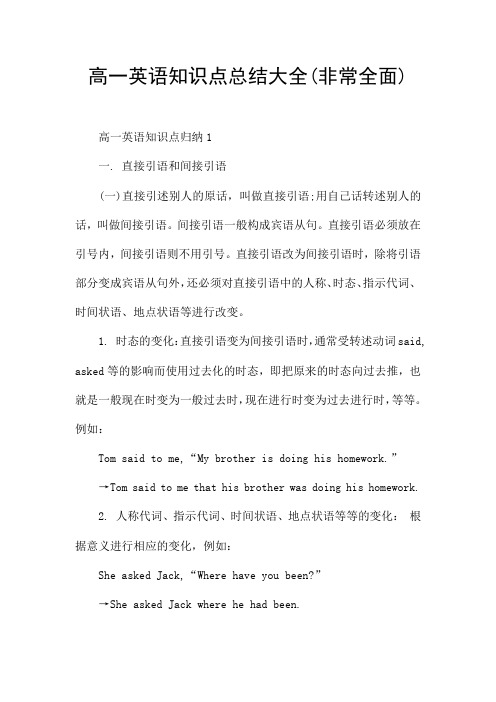
高一英语知识点总结大全(非常全面)高一英语知识点归纳1一. 直接引语和间接引语(一)直接引述别人的原话,叫做直接引语;用自己话转述别人的话,叫做间接引语。
间接引语一般构成宾语从句。
直接引语必须放在引号内,间接引语则不用引号。
直接引语改为间接引语时,除将引语部分变成宾语从句外,还必须对直接引语中的人称、时态、指示代词、时间状语、地点状语等进行改变。
1. 时态的变化:直接引语变为间接引语时,通常受转述动词said, asked等的影响而使用过去化的时态,即把原来的时态向过去推,也就是一般现在时变为一般过去时,现在进行时变为过去进行时,等等。
例如:Tom said to me,“My brother is doing his homework.”→Tom said to me that his brother was doing his homework.2. 人称代词、指示代词、时间状语、地点状语等等的变化:根据意义进行相应的变化,例如:She asked Jack,“Where have you been?”→She asked Jack where he had been.He said,“These books are mine.”→He said that those books were his.(二)直接引语改为间接引语时,都使用陈述语序,但是因为原句的句式不同,所以变成间接引语时所用的连词会有所不同。
直接引语如果是一般疑问句,用连接词whether或if;如果是特殊疑问句,则用疑问词引导间接引语。
转述的动词一般用asked,可以在其后加上一个间接宾语me, him, her, us等。
如:She said,“Is your father at home?”→She asked me if/whether my father was at home.“What do you do every Sunday?”My friend asked me.→My friend asked me what I did every Sunday.直接引语如果是祈使句,改为间接引语时,要将祈使句的动词原形变为带to的不定式,并在不定式的前面根据原句的语气(即请求或命令)加上ask, tell, order等动词,如果祈使句为否定式,则在不定式前加not。
高一英语知识点总结5篇分享
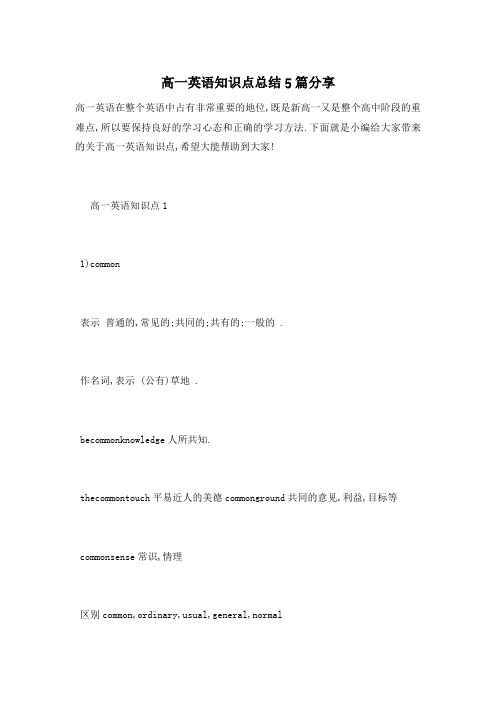
高一英语知识点总结5篇分享高一英语在整个英语中占有非常重要的地位,既是新高一又是整个高中阶段的重难点,所以要保持良好的学习心态和正确的学习方法.下面就是小编给大家带来的关于高一英语知识点,希望大能帮助到大家!高一英语知识点11)common表示普通的,常见的;共同的;共有的;一般的 .作名词,表示 (公有)草地 .becommonknowledge人所共知.thecommontouch平易近人的美德commonground共同的意见,利益,目标等commonsense常识,情理区别common,ordinary,usual,general,normalcommon指因许多事物或许多人所共同具有而常见的意思.ordinary指由于与一般事物性质和标准相同,因而显得平常,无奇特之处. usual 通常的,惯常的 ,含有随集体风俗或个人习惯而常常发生之意. normal意为正常的 ,强调正常性.高一英语知识点21.be good to对友好be good for对有益;be bad to /be bad for2.add up加起来增加add up to合计,总计add to把加到3.not until/till意思是〝直到才〞4.get sth/sb done使完成/使某人被5.calm down平静下来6.be concerned about关心,关注7.当while,when,before,after 等引导的时间状语从句中的主语与主句的主语一致时,可将从句中的主语和be动词省去.While walking the dog,you were careless and it got loose.8.cheat in the e_am考试作弊9.go through经历;度过;获准,通过_.hide away躲藏;隐藏_.set down写下,记下_.I wonder if 我不知道是不是_.on purpose故意_.sth happen to sb某人发生某事sb happen to do sth某人碰巧做某事it so happened that 正巧碰巧_.It is the first(second )that (从句谓语动词用现在完成时)_.in one s power处于的控制之中_.It s no pleasure doing 做没有乐趣It s no good/use doing sth.做某事是没好处/没用的_.She found it difficult to settle and calm down in the hiding place.it做形式宾语_.suffer from患病;遭受_.so that /such thay_.get tired of 对感到劳累疲惫_.have some trouble with sb/sth.在上遇到了麻烦_.get along with sb/sth.与某人相处23.ask(sb)for advice.(向某人)征求建议24.make后接复合宾语,宾语补足语须用不带to的不定式.形容词.过去分词.名词等.常见的有以下几种形式:make sb.do sth.让(使)某人做某事make sb./sth.+adj.使某人/物make sb./oneself+v-ed 让某人/自己被When you speak,you should make yourself understood.make sb.+n.使某人成为25.alone /lonely.单独的/孤独的26.I would be grateful if 委婉客气提出请求27.Why not do =why don t you do高一英语知识点3一.不定冠词不定冠词a,an与one同源,表示微弱的一的概念,但并不强调数目,用来表示不确定的人或事物.A用在辅音前,而不是辅音字母前;an用在元音前,而不是元音字母前.a university in Asia1.表示同类中的任何一个 A cat has nine lives.2.表示泛指的某人.某物I know a John Lennon,but not the famous one.3.表示数量的He has a daughter.4. 表示单位数量的每一I earn _ dollars an hour.5.表示相同的The two birds are of a color.6. 用于集体名词前Hegrows up in a large family.7. 在某种情况下可用于抽象名词和物质名词前China has a long history.高一英语知识点4定语从句1.that指人或物在从句中作主语,宾语或表语which指物在从句中作主语,宾语或表语(作宾语时可以省略)who指人在从句中作主语,宾语或表语whom指人在从句中作宾语whose指人或物在从句中作定语as指人或物在从句中作主语,宾语或表语but指人或物在从句中作主语,宾语或表语注意:指物时,whose+名词=the+名词+ofwhich或ofwhich+the+名词高一英语知识点51. 定义:用作表语的从句叫做表语从句.2. 构成:关联词+简单句3. 引导表语从句的关联词的种类:(1) 从属连词that.例如:The trouble is that I have lost his address. 麻烦是我把他的地址丢了.(2) 从属连词whether, as, as if.例如:He looked just as he had looked ten years before. 他看起来还与十年前一样.The question is whether they will be able to help us. 问题是他们是否能帮我们.注:从属连词if一般不用来引导表语从句,但as if却可引导表语从句,例如:All this was over twenty years ago, but it s as if it was only yesterday. 这都是_多年前的事了,但宛如昨天一样.能跟表语从句的谓语动词一般为系动词be, seem, look等.例如: It looked as if it was going to rain. 看起来天要下雨了.(3)连接代词:Who whom whose whatWhich whoever whatever whichever连接副词:Where when how why例如:The problem is who we can get to replace her. 问题是我们能找到谁去替换她呢.The question is how he did it. 问题是他是如何做此事的.That was what she did this morning on reaching the attic. 那就是她今晨上了阁楼干的.注:1. 连词because可引导表语从句.例如: I think it is because you are doing too much. 我想这是因为你做得太多.2. 在一些表示〝建议.劝说.命令〞的名词后面的表语从句中,谓语动词用虚拟语气.should+动词原形表示,should可省略.例如: My suggestion is that we (should) start early tomorrow. 我的建议是我们明天一早就出发.。
高一英语必修一必背知识点总结5篇
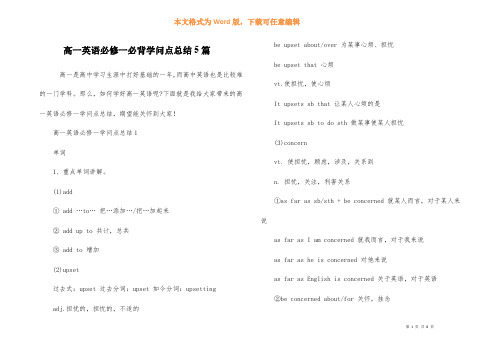
高一英语必修一必背学问点总结5篇高一是高中学习生涯中打好基础的一年,而高中英语也是比较难的一门学科。
那么,如何学好高一英语呢?下面就是我给大家带来的高一英语必修一学问点总结,期望能关怀到大家!高一英语必修一学问点总结1单词1、重点单词讲解。
(1)add① add …to…把…添加…/把…加起来② add up to 共计,总共③ add to 增加(2)upset过去式:upset 过去分词:upset 如今分词:upsettingadj.担忧的,担忧的,不适的 be upset about/over 为某事心烦、担忧be upset that 心烦vt.使担忧,使心烦It upsets sb that 让某人心烦的是It upsets sb to do sth 做某事使某人担忧(3)concernvt. 使担忧,顾虑,涉及,关系到n. 担忧,关注,利害关系①as far as sb/sth + be concerned 就某人而言,对于某人来说as far as I am concerned 就我而言,对于我来说as far as he is concerned 对他来说as far as English is concerned 关于英语,对于英语②be concerned about/for 关怀,挂念have no concerned about/for③be concerned in/with 涉及到,与…有关have no concerned in/with(4)go through①经受,患病,忍受 go through one difficulty after another.经受一个又一个困难。
②认真检查,审查 go through your paper 检查你的试卷。
③扫瞄,翻阅 go through all the related reference.扫瞄相关资料。
④通过,穿过=pass through go through a great forest.穿过一片大森林。
高一英语必修一知识点归纳整理【优秀10篇】
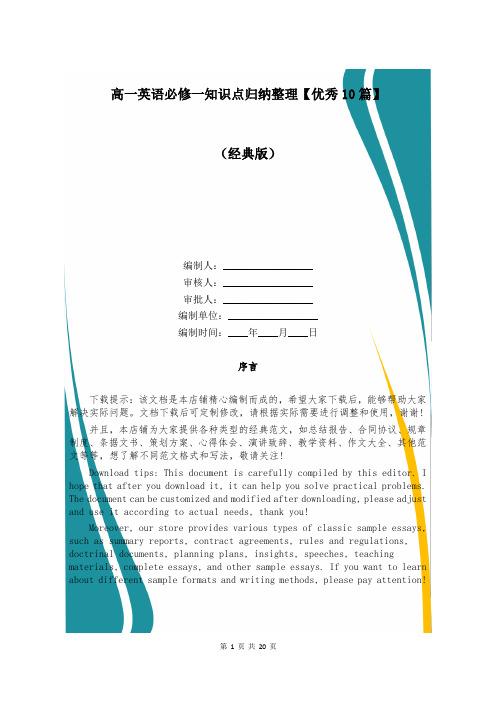
高一英语必修一知识点归纳整理【优秀10篇】(经典版)编制人:__________________审核人:__________________审批人:__________________编制单位:__________________编制时间:____年____月____日序言下载提示:该文档是本店铺精心编制而成的,希望大家下载后,能够帮助大家解决实际问题。
文档下载后可定制修改,请根据实际需要进行调整和使用,谢谢!并且,本店铺为大家提供各种类型的经典范文,如总结报告、合同协议、规章制度、条据文书、策划方案、心得体会、演讲致辞、教学资料、作文大全、其他范文等等,想了解不同范文格式和写法,敬请关注!Download tips: This document is carefully compiled by this editor. I hope that after you download it, it can help you solve practical problems. The document can be customized and modified after downloading, please adjust and use it according to actual needs, thank you!Moreover, our store provides various types of classic sample essays, such as summary reports, contract agreements, rules and regulations, doctrinal documents, planning plans, insights, speeches, teaching materials, complete essays, and other sample essays. If you want to learn about different sample formats and writing methods, please pay attention!高一英语必修一知识点归纳整理【优秀10篇】在课堂上我们一定要全神贯注,在认真听讲和合作探究的过程中,掌握知识、技能和方法。
高一英语知识点总结5篇
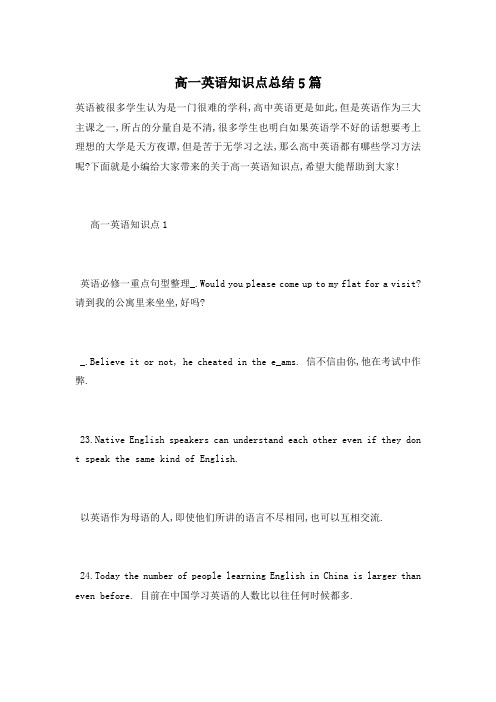
高一英语知识点总结5篇英语被很多学生认为是一门很难的学科,高中英语更是如此,但是英语作为三大主课之一,所占的分量自是不清,很多学生也明白如果英语学不好的话想要考上理想的大学是天方夜谭,但是苦于无学习之法,那么高中英语都有哪些学习方法呢?下面就是小编给大家带来的关于高一英语知识点,希望大能帮助到大家!高一英语知识点1英语必修一重点句型整理_.Would you please come up to my flat for a visit? 请到我的公寓里来坐坐,好吗?_.Believe it or not, he cheated in the e_ams. 信不信由你,他在考试中作弊.23.Native English speakers can understand each other even if they don t speak the same kind of English.以英语作为母语的人,即使他们所讲的语言不尽相同,也可以互相交流.24.Today the number of people learning English in China is larger than even before. 目前在中国学习英语的人数比以往任何时候都多.25.It is the duty of a government to provide education for the children of its country. (it作形式主语)政府的责任是为其国家的小孩提供教育.26.Reading is one of the best ways of improving your vocabulary and usage. 阅读是帮助你改善词汇及其用法的最好方法之一.高一英语知识点2语法一.结构:现在完成时被动语态的结构就是现在完成时态和被动语态结构的叠合,即 have+been+动词过去分词 .二.用法:现在完成时被动语态结构常用于以下两种情况:(1)主谓关系被动,而且谓语动作从过去一直延续到现在;(2)主谓关系被动,而且谓语动作发生在过去,但已对现在造成影响或结果.三.现在完成时主动句和被动句之间的转换:如果要将现在完成时的主动句转换成被动句,则要把其宾语变为主语,谓语动词变为被动结构,主语变为由介词引导的状语或直接将其省略;反之,如果要把被动句变为主动句,则恢复其原来的主语,谓语动词套用主动结构.高一英语知识点3some 与 any 的用法1. some 用于肯定句以及表示建议或期待得到肯定回答的问句.修饰单数名词时,意为某个.如:I have some questions about the assignment. (希望得到肯定答复).2. any 用于否定句和疑问句时,表示一些.用于肯定句时,只和单数名词或不可数名词连用,表示任何.如:The medicine is on sale every where. You can get it at any chemist?s. 二) . each 与 every 的用法1. each 强调个体,表示两个或两个以上中的每一个,在句中可充当主语.宾语.定语和同位语.如:There are trees and flowers at each side of the road.2. every 强调整体,表示三者或三者以上中的每一个,只能作定语,不能说every of them ,要说 every one of them .Every student in our class works hard. 三 . no one 与 none 的用法 1. no one 意为没有人,只能指人,不能指物,不可与介词 of 连用,谓语动词用单数形式,回答 who 引导的问句.如: Who is in the classroom? No one.2. none 既可指人,也可指物,强调数量,意为一点也不,一个也不;谓语动词既可用单数也可用复数;常与 of 连用,通常指三者以上的人或物中没有一个,回答 how much 和 how many 引导的问句.如:They were all tired, but none of them would stop to have a rest. 四 . other, another, others, any other, the other 的用法高一英语知识点4定语从句中的主谓一致1.关系代词作从句的主语时,从句中谓语动词的人称和数要与先行词保持一致,先行词是句子时,从句的谓语动词用单数形式.2.〝oneof+复数名词〞位于关系代词前作先行词时,关系代词在从句中作主语,从句的动词通常用复数,但当one前有the,theonly,thevery等修饰时,从句的谓语动词要用单数.高一英语知识点5词组:because ofcome up come up with come in come on come outactually in fact as a matter of fact in realitybe based onat presentmake use of make full/good use of such asplay a part/role inrecognize asmore than one+谓语用单数at the end of in the end at an end voyage tour travel journeythan ever beforeeven if/thoughcommunicate withthose+定语从句用who__ s _80s in+物主代词+数字的复数 in his forties the former the lattera number of the number ofmake senseusage VS usebelieve it or notthere is no such+名词 (不加冠词)the way+in which/that/省略especially specially straight adj/adv。
高一英语知识点总结7篇

高一英语知识点总结高一英语知识点总结7篇高一英语知识点总结1重点单词1.dream of/about (doing) sth. 梦想;幻想2. pretend to do / be 假装做某事3. to be honest 说实话be honest with sb. 对某人坦白be honest in sth. 坦白承认4. attache… to认为有(重要性、意义);附上;连接5. form the habit of 养成……的'习惯6. perform侧重表演的能力、技巧或效果;主语可以是人或动物act 侧重“扮演、担任”某一角色,侧重于动作,主语通常是人。
performance n.演出;演奏;表演7. in cash 用现金,用现钱pay in cash 给现金;现金支付by credit card 用信用卡by cheque / check 用支票8. play a joke on sb.=play jokes on sb. 戏弄make fun of 捉弄;取笑laugh at sb. 嘲笑9. rely on =depend on 依靠,指望10. or so “大约;……左右”11. break up打碎;分裂;解体;驱散;结束;(学校)放假break down出故障;拆毁;失败;精神崩溃;(身体)垮break into破门而入break off 中断;断交;突然停止break out 爆发;突然发生break away from脱离;摆脱12. above all: 最重要的是,尤其,首先in all: 一共;总计after all: 毕竟;终究;别忘了at all: (否定句)根本,完全 (疑问句)到底高一英语知识点总结2raise vt.“使……上升;升起;提高”等;rise vi.“上升;升起”;arise vi.“站起来(stand up)”,“起床(get up)”rise和arise用作站起,起床都属正式用法;arise主要表示“出现、发生”等意思。
- 1、下载文档前请自行甄别文档内容的完整性,平台不提供额外的编辑、内容补充、找答案等附加服务。
- 2、"仅部分预览"的文档,不可在线预览部分如存在完整性等问题,可反馈申请退款(可完整预览的文档不适用该条件!)。
- 3、如文档侵犯您的权益,请联系客服反馈,我们会尽快为您处理(人工客服工作时间:9:00-18:30)。
高一英语知识点总结(上册)重点词组:1. fond of “喜爱,爱好” 接名词、代词或动词的-ing形式。
例如:He’s fond of swimming. 他喜欢游泳。
Are you fond of fresh vegetables. 你喜欢新鲜蔬菜吗?He is fond of his research work. 他喜爱他的研究工作。
2. hunt for = look for寻找I have found the book I was hunting for.我找到了那本我在找的书。
hunt for a job 找工作3. in order to, so as to 这两个词组都可引导不定式作目的状语, in order to可放于句首, so as to则不能, 其否定形式为in order not to / so as not to. 如:He went to Beijing in order / so as to attend an important meeting.In order to be noticed, he shouted and waved to us.为了让我们注意他, 他朝我们又是叫喊又是挥手。
4. care about1) 喜欢,对……有兴趣= care forShe doesn’t care about money.她不喜欢钱。
2)关心= care forShe thinks only of herself. She doesn’t care about other people.她只考虑自己。
她不关心别人。
3)在乎,在意(接从句或不接任何成分)These young people care nothing about what old people might say.这些年轻人根本不在乎老人说的话。
5. such as 意为“诸如……”,“像……”,是用来列举人或事物的。
She teaches three subjects, such as physics and chemistry.她教三门科目,像物理、化学。
6. drop * a line 留下便条, 写封短信7、make yourself at home 别客气;随便;无拘束(1)If you get to my house before I do, help yourself to a drink and make yourself at home.如果你在我之前到我家,自己喝点饮料,随便一点。
8、stay up 不睡;熬夜(1)I'll be late home, don't stay up for me.我将回家很晚,不要等我了。
(2)He stayed up reading until 2:00 in the morning.他熬夜看书直到凌晨两点。
9、come about 引起;发生;产生(1)How did the accident come about?这场事故是怎么发生的?(2)They didn't know how the change had come about.他们不知道这个变化是怎样产生的。
10、except for 除……之外(1)except 与except for 的用法常有区别。
except 多用于引起同类事物中被排除的一项。
如:①He answered all the questions except the last one.除去最后一个,他回答了所有问题。
②We go there every day except Sunday.除了星期天,我们天天去那里。
(2)except for 用于引述细节以修正句子的主要意思。
如:①Except for one old lady, the bus was empty.除去一个老太太,这辆公共汽车全空了。
②Your picture is good except for the colours.你的画儿很好,只是某些色彩有问题。
(3)但在现代英语中,except for也用于表示except的意思。
如上述第一个例子可以是:He answered all the questions except for the last one.(4)另外,在介词短语之前只能用except,不能用except for。
如:We go to bed before ten, except in the summer.除了夏季,我们通常十点之前上床睡觉。
11、end up with 以……告终;以……结束(1)The party ended up with an English song.聚会以一首英文歌结束。
12、more or less 几乎;差不多;大约;大概;大体上(1)I've more or less succeeded, but they haven't.我差不多成功了,而他们没有。
(2)Our living condition has more or less improved.我们的生活水平或多或少提高了。
13、bring in 引进;引来;吸收(1)We should bring in new technology.我们应该引进新技术。
(2)He brings in 800 dollars a month.他一个月挣八百美元。
14、get away(from)逃离(1)The thieves got away from the shop with all our money.小偷带着我们所有的钱从商店逃跑了。
(2)I caught a really big fish but it got away.我钓到了一条好大的鱼,可是它逃掉了。
15、watch out (for)注意;留心(1)Watch out! There is a car coming.小心!汽车来了。
(2)Watch out for the hole in the road.留神路上的那个坑。
16、see sb. off 给某人送行Tomorrow I will see my friend off at the railway station.明天我到火车站给朋友送行。
17、on the other hand 另一方面(用以引出相互矛盾的观点、意见等,常说on the one hand …… on the other hand一方面……另一方面)I know this job of mine isn't well paid, but on the other hand I don't have to work long hours.我知道这份工作报酬不高,但从另一方面来说,我也不必工作太长时间。
18、as well as * (sth)而且He is a talented musician as well as being a photographer.她不但是摄影师还是个天才的音乐家。
19、take place 发生take one’s place 入座、站好位置、取得地位take sb’s place 或take the place of * / sth代替、取代The Olympic Games take place / are held every four years.20、on fire 相当于burning, 意为“燃烧;着火;起火”,有静态的含意。
Catch fire 有动态的含意。
Set… on fire / set fire to …用来表示“使……着火”、“放火烧……”。
例如:Look, the theatre is on fire! Let’s g o and help.瞧,剧院着火了,咱们去帮忙救火吧。
21、on holiday 在度假,在休假中When I was on holiday, I visited my uncle. 我在度假的时候去看望了叔叔。
holiday(holidays)一般指“休假”Tom and I are going to have a holiday. 我和汤姆准备去度假。
I've already had my holidays this year. 我今年已经度过假了。
22、travel agencyA business that attends to the details of transportation, itinerary, and accommodationsfor travelers. 旅行社一种为旅行者提供细致的运输、旅行和住宿方面服务的行业Also called: travel bureau23、take off 1)脱下(衣服等), 解(除)掉He took off his wet shoes.他脱下了湿鞋子。
2)(飞机)起飞The plane took off on time. It was a smooth take-off.飞机准时起飞。
起飞非常顺利。
3)匆匆离开The six men got into the car and took off for the park.这六个人上了车,匆匆离开去公园。
24. go wrong v. 走错路, 误入岐途, (机器等)发生故障25. in all adv. 总共26. stay away v.外出27. look up 查询(如宾语为代词,则代词放中间)Look up the word in the dictionary.在字典里查单词。
相关词组:look for 寻找;look after照顾,照料;look forward to期待;look into 调查;look on旁观;look out注意;look out for注意,留心,提防;look over翻阅,查看,检查;look around环视;look through翻阅,查看。
28、run after追逐,追求If you run after two hares, you will catch neither.同时追两只兔子,你一只也抓不到。
29、on the air广播We will be on the air in five minutes.我们五分钟以后开始广播。
This programme comes on the air at the same time every day.这个节目每天在同一时间播出。
30、think highly/well/much of对……评价很高, 赞赏, 对……印象好He was highly thought of by the manager.经理对他非常赞赏。
